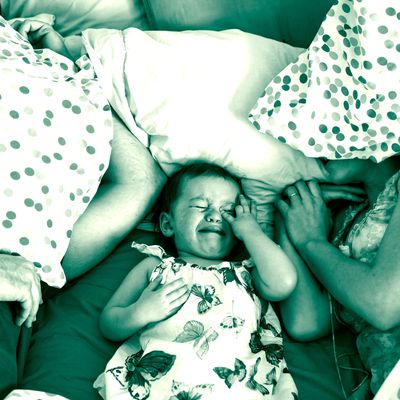
While it’s been widely agreed that The Children Are Our Future, there’s increasing evidence that having kids might be a bad idea if what you want is to be as happy as possible all the time, especially if you live in a country (America) where there’s a laughable lack of policy support for fitting family and career into the same life.
The latest research comes from a briefing paper for the Council on Contemporary Families, in which a team led by University of Texas sociologist Jennifer Glass gathered survey data from 22 English-speaking and European countries. They only used data from 2006 to 2008, figuring that it would be unfair compare recession-era happiness levels to non-recession levels. So as to account for cultural differences in happiness averages — Americans tend to be happier overall, while the French are more moderate (imagine that) — the team simply compared the parent and nonparent happiness data within countries. Glass and her colleagues found that in some countries — Norway and Hungary, for instance — having kids increased self-reported happiness. And the country with the biggest gap in happiness for parents and nonparents was, sad to say, the United States.
While this sort of analysis can’t completely isolate a causal mechanism for the difference, Glass did find a very strong correlation between the parental support policies offered by a country and the way parentage correlated with happiness. So it’s not that American kids are worse for their parents than the kids of every other country, but that childrearing evidently takes an outsize toll on American parents, given that the U.S. doesn’t have mandated paid parental leave (placing it in the company of Lesotho, Swaziland, and Papua New Guinea) and that the state of child care in America is, as in the words of Paul Krugman, “cruel and shameful.” In the countries with robust family support policies, “the parental deficit in happiness was completely eliminated, accomplished by raising parents’ happiness rather than lowering nonparents’ happiness,” Glass told Quartz.
As with anything else that’s ever existed, there are limits to this research. Given that philosophers and other thinkfluencers have been debating the nature of happiness for at least 2,500 years, self-reported happiness is a pretty slippery metric. One aspect of national culture that jumps out — even when taking into account that the researchers were careful to compare happiness in parents and nonparents — is that Americans are a highly aspirational lot; could it be a similar case to how hard it is to have a “good marriage” these days because people have higher standards for their relationships? Maybe trademark American optimism is getting in the way of being satisfied with kids.
But beyond the methodological hairsplitting, the takeaway is pretty obvious. If, with all the talk of “family values,” the U.S. spent more on supporting families — and there’s certainly room to grow — it could result in happier families.




